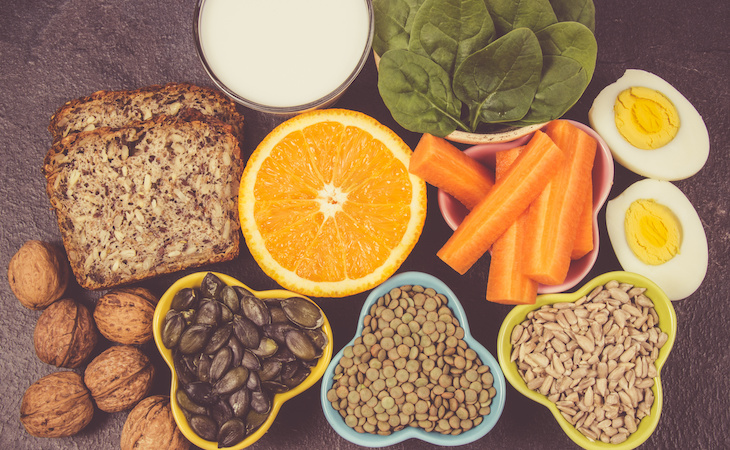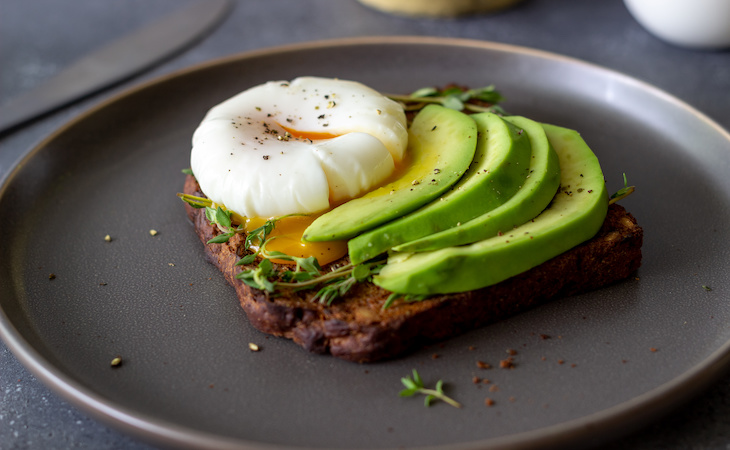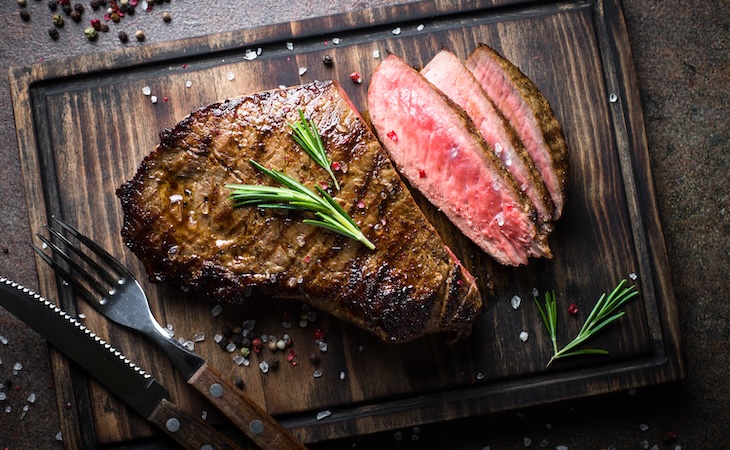Vitamins, in general, are very important for your overall health—so much so that we have essential and non-essential vitamins.
Essential vitamins (A, C, D, E, K, and B vitamins) are required for optimal functioning of your body. [1] While they have multiple functions, certain vitamins such as C, D, and B can affect your sleep.
This article will specifically explore the connection between B vitamins and sleep.
Types of B vitamins
B vitamins, also known as B complex vitamins, are a group of eight water-soluble vitamins. This means your body gets rid of them daily, so they need to be replenished daily. [2]
The B complex vitamins are:
- Thiamine (B1): Vitamin B1 is an important factor in the breakdown of carbohydrates and amino acids (the building blocks of protein). This vitamin is transported by your red blood cells to organs that have high energy needs, such as the heart and brain. [3]
- Riboflavin (B2): Vitamin B2 has been shown to reduce oxidative stress. It also activates certain immune system cells (neutrophils and macrophages). [4]
- Niacin (B3): Vitamin B3 is important for the breakdown of macronutrients, including carbs, protein, fiber, and fat. [5]
- Pantothenic acid (B5): Vitamin B5 is involved in the production of coenzyme A. Coenzyme A is involved in multiple functions such as cell growth and the production of neurotransmitters. [6]
- Pyridoxine (B6): Vitamin B6 converts into an active form inside the body and aids in the breakdown of amino acids, carbohydrates, proteins, and fats. It also helps in the production of neurotransmitters. [7]
- Biotin (B7): Vitamin B7 helps break down food into glucose. This glucose is the main source of carbohydrates for your brain and body. Despite limited evidence, vitamin B7 has become popular for promoting hair and nail growth. [8]
- Folate (B9): Folate is naturally present in green leafy vegetables and is important for the removal of toxins, regulation of genes, and the division of cells. [9]
- Cobalmin (B12): Vitamin B12, after being absorbed in your intestine, plays an important role in the functions of your brain, nerves, and blood. [10]
Does vitamin B help you sleep?
There’s some evidence that certain vitamin B types can affect your sleep.
A 2019 analysis of the National Health and Nutrition Examination Survey (2005-2016) showed that short sleep was associated with low intake of folate (dietary and supplements) and vitamin B6 in women ages 19+. [11]
Men ages 19 to 50 with low intake of vitamin B12 and B1 (dietary and supplements) were also seen to be affected by short sleep. [11]
Deficiencies of vitamin B12 and vitamin B9 can lead to anemia, which, in turn, can cause fatigue and make you sleep more than usual. Treatment of these anemias may bring your sleep schedule back to normal. [9, 10]
A 2023 cross-sectional study of 512 participants in Greece showed that insufficient levels of vitamin B12 were associated with an increased risk of insomnia. [12]
Another 2023 analysis of NHANES (2005-2008) showed that decreased folic acid levels were associated with increased difficulty in falling asleep. [13]
The best foods with vitamin B for sleep
B vitamins should be present in your everyday diet as they’re removed from your body daily. Eating foods rich in these vitamins may improve the quality of your sleep and can help you avoid vitamin deficiencies.
Here are some foods you can incorporate into your diet if you’re facing sleep difficulties:
- Foods rich in vitamin B1 include whole grains, meat, fish, and pork. [14]
- Foods rich in vitamin B9 include green leafy vegetables like spinach, fruits, and liver. [9]
- Natural sources of vitamin B12 include animal products such as red meat, dairy, and eggs. You can also get vitamin B12 through fortified foods such as cereal. [10]
Taking B vitamins for sleep
Though the best way to get in by vitamins is through nutrition, your doctor may recommend supplements if you have a vitamin B deficiency.
Although people can safely take over-the-counter multivitamins, it’s best to visit a doctor to check for vitamin deficiencies and other health conditions if you’re experiencing sleep issues.
Multiple vitamin deficiencies can occur in an individual and it can be difficult to determine the vitamin deficiency causing the issue without adequate testing.
Other vitamins for sleep
Other vitamins such as vitamin D and vitamin C may help promote healthy sleep patterns.
Vitamin D has been studied quite extensively for its role in sleep. A 2020 study published in the Journal of Clinical Sleep Medicine showed that a deficiency of vitamin D in day shift workers was related to a shorter duration of total sleep time and excessive daytime sleepiness. [15]
It’s also been associated with nocturnal awakenings in children and adults. [16] With 40.9% of Americans shown to be insufficient in vitamin D, a lack of this vitamin might be the cause of your sleep issues. [17]
Vitamin C has also been shown to help protect the brain against memory loss related to sleep deprivation. [18]
FAQs
Does vitamin B12 interrupt sleep?
The research on this is mixed. Some studies show higher amounts of vitamin B12 are linked to shorter sleep duration and increased risk of insomnia. [19, 20] However, other research has found that increasing vitamin B12 levels doesn’t interrupt sleep. [21]
Does Vitamin B complex make you sleepy?
Generally, a vitamin B complex is supposed to boost your energy—but for some individuals, it can cause sleepiness. This may be due to certain B vitamins in it, their forms, or their dosage.
Does taking vitamins at night affect sleep?
Though there isn’t a best time to take vitamins, always discuss with a medical professional when adding a vitamin to your routine. Vitamin B complexes, if taken at night, may interrupt your sleep as they break down the carbohydrates in your food to give you energy.
What other nutrients play a role in sleep? Next up, learn all about the relationship between magnesium and sleep.
References
- National Institutes of Health: National Institute on Aging. https://www.nia.nih.gov/health/vitamins-and-supplements/vitamins-and-minerals-older-adults
- Hanna, M., Jaqua, E., Nguyen, V., & Clay, J. (2022). B Vitamins: Functions and Uses in Medicine. The Permanente journal, 26(2), 89–97. https://doi.org/10.7812/TPP/21.204
- Smith, T. J., Johnson, C. R., Koshy, R., Hess, S. Y., Qureshi, U. A., Mynak, M. L., & Fischer, P. R. (2021). Thiamine deficiency disorders: a clinical perspective. Annals of the New York Academy of Sciences, 1498(1), 9–28. https://doi.org/10.1111/nyas.14536
- Suwannasom, N., Kao, I., Pruß, A., Georgieva, R., & Bäumler, H. (2020). Riboflavin: The Health Benefits of a Forgotten Natural Vitamin. International journal of molecular sciences, 21(3), 950. https://doi.org/10.3390/ijms21030950
- Redzic S, Hashmi MF, Gupta V. Niacin Deficiency. [Updated 2023 Jul 25]. In: StatPearls [Internet]. Treasure Island (FL): StatPearls Publishing; 2024 Jan-. Available from: https://www.ncbi.nlm.nih.gov/books/NBK557728/
- Sanvictores T, Chauhan S. Vitamin B5 (Pantothenic Acid) [Updated 2024 Feb 29]. In: StatPearls [Internet]. Treasure Island (FL): StatPearls Publishing; 2024 Jan-. Available from: https://www.ncbi.nlm.nih.gov/books/NBK563233/
- Abosamak NER, Gupta V. Vitamin B6 (Pyridoxine) [Updated 2023 Aug 17]. In: StatPearls [Internet]. Treasure Island (FL): StatPearls Publishing; 2024 Jan-. Available from: https://www.ncbi.nlm.nih.gov/books/NBK557436/
- Bistas KG, Tadi P. Biotin. [Updated 2023 Jul 3]. In: StatPearls [Internet]. Treasure Island (FL): StatPearls Publishing; 2024 Jan-. Available from: https://www.ncbi.nlm.nih.gov/books/NBK554493/
- Khan KM, Jialal I. Folic Acid Deficiency. [Updated 2023 Jun 26]. In: StatPearls [Internet]. Treasure Island (FL): StatPearls Publishing; 2024 Jan-. Available from: https://www.ncbi.nlm.nih.gov/books/NBK535377/
- Ankar A, Kumar A. Vitamin B12 Deficiency. [Updated 2024 Sep 10]. In: StatPearls [Internet]. Treasure Island (FL): StatPearls Publishing; 2024 Jan-. Available from: https://www.ncbi.nlm.nih.gov/books/NBK441923/
- Ikonte, C. J., Mun, J. G., Reider, C. A., Grant, R. W., & Mitmesser, S. H. (2019). Micronutrient Inadequacy in Short Sleep: Analysis of the NHANES 2005-2016. Nutrients, 11(10), 2335. https://doi.org/10.3390/nu11102335
- Bouloukaki, I., Lampou, M., Raouzaiou, K. M., Lambraki, E., Schiza, S., & Tsiligianni, I. (2023). Association of Vitamin B12 Levels with Sleep Quality, Insomnia, and Sleepiness in Adult Primary Healthcare Users in Greece. Healthcare (Basel, Switzerland), 11(23), 3026. https://doi.org/10.3390/healthcare11233026
- An, H., Xue, Q., & Zhang, J. (2023). The association between serum total folic acid concentration and severe difficulty falling asleep in US adults: NHANES 2005-2008. Frontiers in neurology, 14, 1225403. https://doi.org/10.3389/fneur.2023.1225403
- National Institutes of Health: Office of Dietary Supplements. Thiman: Fact Sheet for Health Professionals. https://ods.od.nih.gov/factsheets/Thiamin-HealthProfessional/
- Lee, H. J., Choi, H., & Yoon, I. Y. (2020). Impacts of serum vitamin D levels on sleep and daytime sleepiness according to working conditions. Journal of clinical sleep medicine : JCSM : official publication of the American Academy of Sleep Medicine, 16(7), 1045–1054. https://doi.org/10.5664/jcsm.8390
- Abboud M. (2022). Vitamin D Supplementation and Sleep: A Systematic Review and Meta-Analysis of Intervention Studies. Nutrients, 14(5), 1076. https://doi.org/10.3390/nu14051076
- Cui, A., Xiao, P., Ma, Y., Fan, Z., Zhou, F., Zheng, J., & Zhang, L. (2022). Prevalence, trend, and predictor analyses of vitamin D deficiency in the US population, 2001-2018. Frontiers in nutrition, 9, 965376. https://doi.org/10.3389/fnut.2022.965376
- Zhao, M., Tuo, H., Wang, S., & Zhao, L. (2020). The Effects of Dietary Nutrition on Sleep and Sleep Disorders. Mediators of inflammation, 2020, 3142874. https://doi.org/10.1155/2020/3142874
- Beydoun, M. A., Gamaldo, A. A., Canas, J. A., Beydoun, H. A., Shah, M. T., McNeely, J. M., & Zonderman, A. B. (2014). Serum nutritional biomarkers and their associations with sleep among US adults in recent national surveys. PloS one, 9(8), e103490. https://doi.org/10.1371/journal.pone.0103490
- Xiong, S., Liu, Z., Yao, N., Zhang, X., & Ge, Q. (2022). The independent association between vitamin B12 and insomnia in Chinese patients with type 2 diabetes mellitus: a cross-sectional study. Nutrition & diabetes, 12(1), 3. https://doi.org/10.1038/s41387-022-00181-8
- Channer-Wallen, T., Dawson, P., Thomas-Brown, P. G., & Gossell-Williams, M. (2022). Lack of association between serum vitamin B12 and nocturnal sleep parameters following cyanocobalamin supplementation in healthy adults. Heliyon, 8(2), e08831. https://doi.org/10.1016/j.heliyon.2022.e08831




